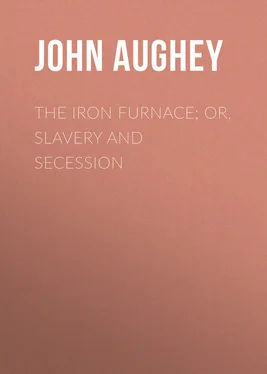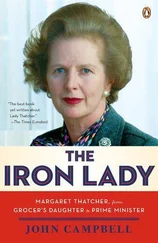John Aughey - The Iron Furnace; or, Slavery and Secession
Здесь есть возможность читать онлайн «John Aughey - The Iron Furnace; or, Slavery and Secession» — ознакомительный отрывок электронной книги совершенно бесплатно, а после прочтения отрывка купить полную версию. В некоторых случаях можно слушать аудио, скачать через торрент в формате fb2 и присутствует краткое содержание. ISBN: , Жанр: foreign_antique, foreign_prose, Историческая проза, на английском языке. Описание произведения, (предисловие) а так же отзывы посетителей доступны на портале библиотеки ЛибКат.
- Название:The Iron Furnace; or, Slavery and Secession
- Автор:
- Жанр:
- Год:неизвестен
- ISBN:http://www.gutenberg.org/ebooks/38855
- Рейтинг книги:3 / 5. Голосов: 1
-
Избранное:Добавить в избранное
- Отзывы:
-
Ваша оценка:
- 60
- 1
- 2
- 3
- 4
- 5
The Iron Furnace; or, Slavery and Secession: краткое содержание, описание и аннотация
Предлагаем к чтению аннотацию, описание, краткое содержание или предисловие (зависит от того, что написал сам автор книги «The Iron Furnace; or, Slavery and Secession»). Если вы не нашли необходимую информацию о книге — напишите в комментариях, мы постараемся отыскать её.
The Iron Furnace; or, Slavery and Secession — читать онлайн ознакомительный отрывок
Ниже представлен текст книги, разбитый по страницам. Система сохранения места последней прочитанной страницы, позволяет с удобством читать онлайн бесплатно книгу «The Iron Furnace; or, Slavery and Secession», без необходимости каждый раз заново искать на чём Вы остановились. Поставьте закладку, и сможете в любой момент перейти на страницу, на которой закончили чтение.
Интервал:
Закладка:
‘Two deep, dark stains, mar all our country’s bliss:
Foul slavery one, and one, loathed drunkenness.’
You have the work of an English writer of high repute, who says, ‘Forty years ago, some in England doubted whether slavery were a sin, and regarded adultery as a venial offence; but behold the progress of truth! Who now doubts that he who enslaves his fellow-man is guilty of a fearful crime, and that he who violates the seventh commandment is a great sinner in the sight of God?’”
“You are known to be an adept in Phonography, and you are reported to be a correspondent of an abolition Phonographic journal.”
“I understand the science of Phonography, and I am a correspondent of a Phonographic journal, but the journal eschews politics.”
Another member of the committee then interrogated me.
“Parson Aughey, what is Funnyography?”
“Phonography, sir, is a system of writing by means of a philosophic alphabet, composed of the simplest geometrical signs, in which one mark is used to represent one and invariably the same sound.”
“Kin you talk Funnyography? and where does them folks live what talks it?”
“Yes, sir, I converse fluently in Phonography, and those who speak the language live in Columbia.”
“In the Destrict?”
“No, sir, in the poetical Columbia.”
I was next interrogated by another member of the committee.
“Parson Aughey, is Phonography a Abolition fixin?”
“No, sir; Phonography, abstractly considered, has no political complexion; it may be used to promote either side of any question, sacred or profane, mental, moral, physical, or political.”
“Well, you ought to write and talk plain English, what common folks can understand, or we’ll have to say of you, what Agrippa said of Paul, ‘Much learning hath made thee mad.’ Suppose you was to preach in Phonography, who’d understand it? – who’d know what was piped or harped? I’ll bet high some Yankee invented it to spread his abolition notions underhandedly. I, for one, would be in favour of makin’ the parson promise to write and talk no more in Phonography. I’ll bet Phonography is agin slavery, tho’ I never hearn tell of it before. I’m agin all secret societies. I’m agin the Odd-fellers, Free-masons, Sons of Temperance, Good Templars and Phonography. I want to know what’s writ and what’s talked. You can’t throw dust in my eyes. Phonography, from what I’ve found out about it to-day, is agin the Confederate States, and we ought to be agin it.”
Parson Locke then resumed:
“I must stop this digression. Parson Aughey, are you in favour of the South?”
“I am in favour of the South, and have always endeavoured to promote the best interests of the South. However, I never deemed it for the best interests of the South to secede. I talked against secession, and voted against secession, because I thought that the best interests of the South would be put in jeopardy by the secession of the Southern States. I was honest in my convictions, and acted accordingly. Could the sacrifice of my life have stayed the swelling tide of secession, it would gladly have been made.”
“It is said that you have never prayed for the Southern Confederacy.”
“I have prayed for the whole world, though it is true that I have never named the Confederate States in prayer.”
“You may retire.”
After I had retired, the committee held a long consultation. My answers were not satisfactory. I never learned all that transpired. They brought in no formal verdict. The majority considered me a dangerous man, but feared to take my life, as they were, with one exception, adherents of other denominations, and they knew that my people were devotedly attached to me before the secession movement. Some of the secessionists swore that they would go to my house and murder me, when they learned that the committee had not hanged me. My friends provided me secretly with arms, and I determined to defend myself to the last. I slept with a double-barrelled shot-gun at my head, and was prepared to defend myself against a dozen at least.
Learning that I was not acceptable to many of the members of my church, whilst my life was in continual jeopardy, and my family in a state of constant alarm, I abandoned my field of labour, and sought for safety in a more congenial clime. I intended to go North. Jeff. Davis and his Congress had granted permission to all who so desired, to leave the South. Several Union men of my acquaintance applied for passports, but were refused. The proclamation to grant permits was an act of perfidy; all those, so far as I am informed, who made application for them, were refused. The design in thus acting was to get Union men to declare themselves as such, and afterwards to punish them for their sentiments by forcing them into the army, confining them in prison, shooting them, or lynching them by mob violence. Finding that were I to demand a passport to go north, I would be placed on the proscribed list, and my life endangered still more, I declared my intention of going back to Tishomingo county, in which I owned property, and which was the home of many of my relatives. I knew that I would be safer there, for this county had elected Union delegates by a majority of over fourteen hundred, and a strong Union sentiment had always prevailed.
On my arrival in Tishomingo, I found that the great heart of the county still beat true to the music of the Union. Being thrown out of employment I deemed it my duty, in every possible way, to sustain the Union cause and the enforcement of the laws. It was impossible to go north. Union sentiments could be expressed with safety in many localities. Corinth, Iuka, and Rienzi had, from the commencement of the war, been camps of instruction for the training of Confederate soldiers. These three towns in the county being thus occupied, Union men found it necessary to be more cautious, as the cavalry frequently made raids through the county, arresting and maltreating those suspected of disaffection. After the reduction of Forts Henry and Donelson, and the surrender of Nashville, the Confederates made the Memphis and Charleston railroad the base of their operations, their armies extending from Memphis to Chattanooga. Soon, however, they were all concentrated at Corinth, a town in Tishomingo county, at the junction of the Memphis and Charleston railroad with the Mobile and Ohio. After the battle of Shiloh, which was fought on the 6th and 7th of April, the Federal troops held their advance at Farmington, four miles from Corinth, while the Confederates occupied Corinth, their rear guard holding Rienzi, twelve miles south, on the Mobile and Ohio railroad.
Thus there were two vast armies encamped in Tishomingo county. Being within the Confederate lines, I, in common with many others, found it difficult to evade the conscript law. Knowing that in a multitude of counsellors there is wisdom, we held secret meetings, in order to devise the best method of resisting the law. We met at night, and had our countersigns to prevent detection. Often our wives, sisters, and daughters met with us. Our meeting-place was some ravine, or secluded glen, as far as possible from the haunts of the secessionists; all were armed; even the ladies had revolvers, and could use them too. The crime of treason we were resolved not to commit. Our counsels were somewhat divided, some advocating, as a matter of policy, the propriety of attending the militia musters, others opposing it for conscience’ sake, and for the purpose of avoiding every appearance of evil. Many who would not muster as conscripts, resolved to escape to the Federal lines; and making the attempt two or three at a time, succeeded in crossing the Tennessee river, and reaching the Union army, enlisted under the old flag, and have since done good service as patriot warriors. Some who were willing to muster as conscripts, were impressed into the Confederate service, and I know not whether they ever found an opportunity to desert. Others, myself among the number, were saved by the timely arrival of the Federal troops, and the occupation of the county by them, after Beauregard’s evacuation of Corinth. I had received three citations to attend muster, but disregarding them, I was summoned to attend a court-martial on the first day of June, at the house of Mr. Jim Mock. The following is a copy of the citation.
Читать дальшеИнтервал:
Закладка:
Похожие книги на «The Iron Furnace; or, Slavery and Secession»
Представляем Вашему вниманию похожие книги на «The Iron Furnace; or, Slavery and Secession» списком для выбора. Мы отобрали схожую по названию и смыслу литературу в надежде предоставить читателям больше вариантов отыскать новые, интересные, ещё непрочитанные произведения.
Обсуждение, отзывы о книге «The Iron Furnace; or, Slavery and Secession» и просто собственные мнения читателей. Оставьте ваши комментарии, напишите, что Вы думаете о произведении, его смысле или главных героях. Укажите что конкретно понравилось, а что нет, и почему Вы так считаете.










![John Bruce - The Lettsomian Lectures on Diseases and Disorders of the Heart and Arteries in Middle and Advanced Life [1900-1901]](/books/749387/john-bruce-the-lettsomian-lectures-on-diseases-and-disorders-of-the-heart-and-arteries-in-middle-and-advanced-life-1900-1901-thumb.webp)

